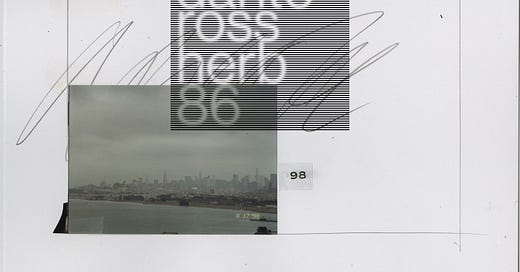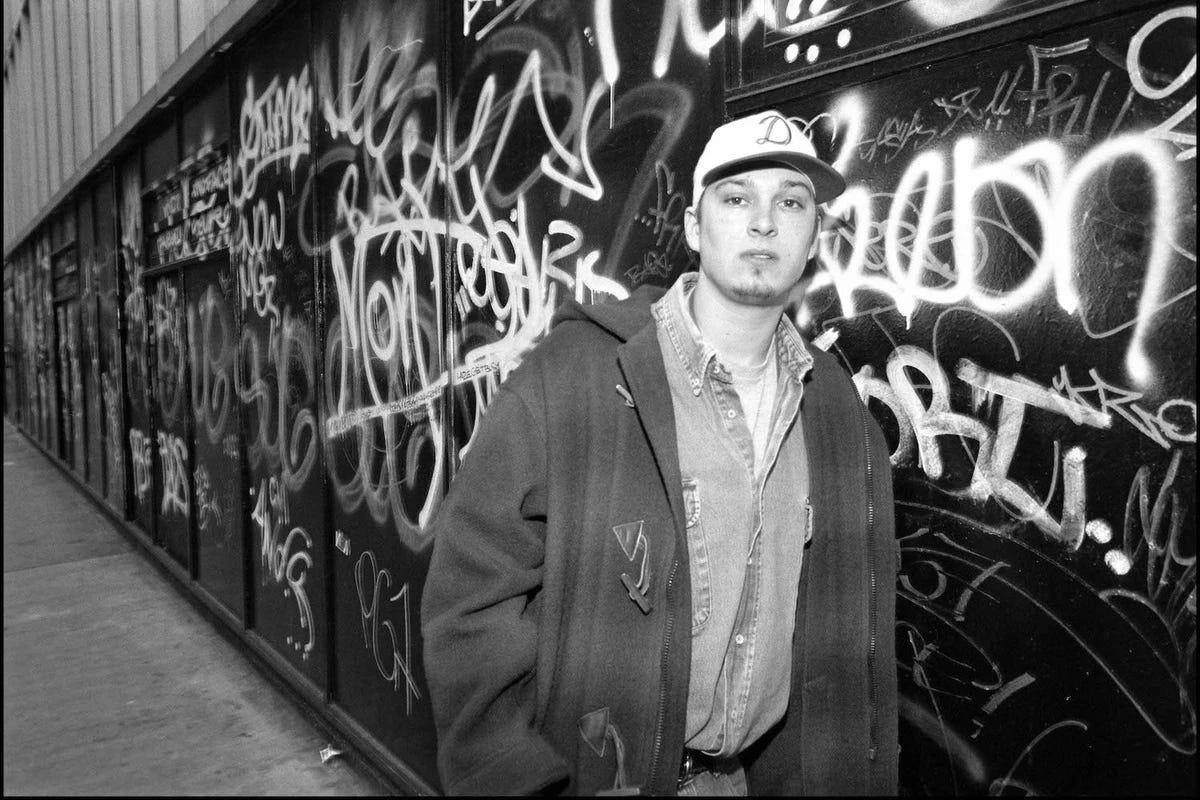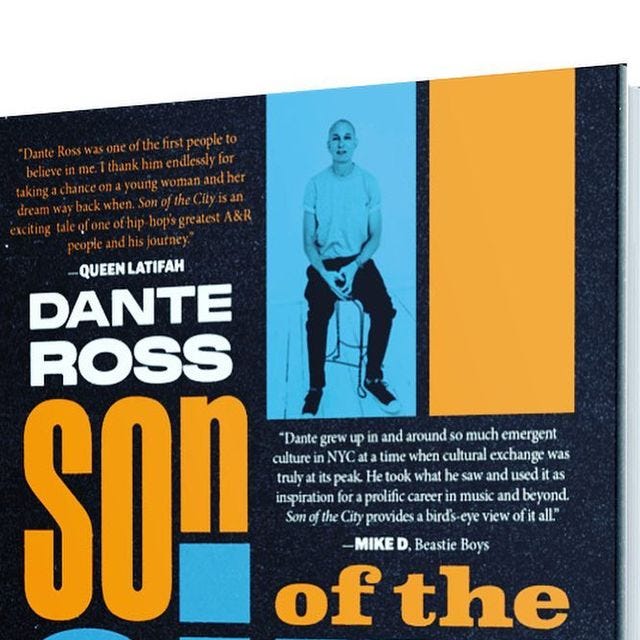Herb Sundays 86: Dante Ross
The legendary A&R and producer shares an extended New York-centric Sunday afternoon playlist
Herb Sundays 86: Dante Ross (Apple, Spotify, Tidal, Amazon). Art by Michael Cina.
“Before hip-hop consumed my life (and my crew's), we listened to what we then called ‘club music’ alongside early hip-hop and post-punk/new wave. As a kid, I had a gig skating a half pipe in a nightclub called Area in Tribeca for a summer.
After work, my friend the fabulous Ms. Lysa Cooper, and a crew of super hip, beautiful girls and guys would go to the legendary Paradise Garage and dance till daylight, then go to Rockaway Beach and nap on the beach. Psychedelics were often in the mix.
The sound, the music, and possibly the drugs made it the greatest dance party I have ever been to. It was a black, pansexual forerunner to a rave. One big difference: it was soulful, very New York, and funky as hell. I remember people spreading baby powder on the floor to be able to slide around while dancing like it was yesterday, yet it feels like a zillion years ago. I had no idea what I was experiencing at the time or how important Larry Levan was. In retrospect, I only went there 10-15 times;
if only I had known, right?
Anyways these tunes are a little reflection of those times and what I like to listen to at the house when I'm just relaxing. Very little hip-hop gets played in the pad, on a Sunday, it makes me feel like I'm working.” - Dante Ross
Dante Ross is a Grammy-winning record producer and legendary A&R for labels such as Tommy Boy, Elektra, and Loud Records. Born in San Francisco and raised in New York City, he ran with the first wave of characters who would take Hip-Hop into its Golden Era in the ‘90s and beyond. Ross’s major signings proved that the genre’s most powerful thinkers could also be chart-friendly and was responsible in part for the elevation of artists such as De La Soul, Queen Latifah, Digital Underground, Brand Nubian, Grand Puba, Del the Funky Homosapien, Pete Rock & CL Smooth, KMD, Leaders of the New School, Busta Rhymes, and Ol' Dirty Bastard, amongst many others.
Dante has a new autobiography out, Son Of The City (via Rare Bird Lit) which is incredible so far (almost done). Ross obviously wrote it himself, which you can’t take for granted these days, and it works because he can tell a great story and has a ton of learned experience. He also isn’t afraid to let the tea spray which carries into his Twitter feed. I am half expecting to catch a stray after this, but it’s worth it. In the book he shares some of the heavier aspects of his Lower East Side childhood as well as the fun of NYC in the era and is candid about his industry experiences. Can’t recommend enough for fans of these topics.
If you tell people you work in music, A&R is the job most people's minds turn to, besides being an artist itself. For those who don’t know the definition, the title Artists and Repertoire (A&R) is effectively the person who finds/develops artists and helps them take their songs and albums to fruition. The repertoire in question is the songs themselves, which especially in a previous era where artists weren’t expected to write (think Sinatra, etc.), you needed people to match singers to songs to find alchemical crossover moments.
Thanks to media and movies, A&R has taken on a spiritual quality and we have star producers like Rick Rubin who has a shamanic persona that plays to this concept. It’s a myth that is only partially true and usually is overwrought. It’s dangerous to give the A&R too much credit though, ultimately it comes down to the artists (the ones who are successful tend to work a lot and don’t stop) but maybe like a coach/player dynamic, you need both to hit major heights. Hip-Hop (especially in its early days) is a team sport but you also need an apparatus or someone to co-sign you. For instance, Ross’s colleague at Tommy Boy was the great Monica Lynch who Dante acknowledges as the true creative brains of Tommy Boy.
At their best though, good A&Rs are the people that see the future before the rest of us do, they can see the potential, and pitfalls, of a project and can endear themselves to artists and managers, as well as convince the rest of the team that it’s worth investing. Before Social Media and the dominance of Soundscan, the act of deciding what music to release was more mercurial. It’s both an introverted and an extroverted sport and to be played well, one that requires a great love for artists.
By definition, I have “a&r’d” hundreds of releases, which can mean just helping on tracklists, but sometimes lands you as the first call when an artist is in the Emergency Room which has happened to me multiple times now. Like most creative roles, you can think you’re pretty slick, but when you are around people who are GREAT at the job, you quickly file back in line and shut your mouth. I’ve been lucky to work with much better A&R talent like Jakub Alexander who was an A&R (amongst many things) at Ghostly and is still doing the job for both his labels and a major distribution company. I also get to work with people better than myself such as Alex Berenson, Nigil Mack, and Chris Swanson, who I gladly sit passenger seat, back seat, or just traffic coordinator to, whatever helps their cause.
Dante Ross is considered amongst the best to wear this hat, thanks to his recognition of mainly underground talent that had wider appeal without sacrificing political or artistic goals. He has been quick to acknowledge his privilege as a white male, which gave him access to corporate circles to serve his taste. There is a list longer than this email of unsung heroes of indie culture. These scribes, promoters, designers and evangelists were needed for the art to achieve immortality, including the women and minorities who helped this culture grow. It is part of this cabal of people that Ross also belongs to a special caste of cool young kids who helped shape the culture in the ‘80s and ‘90s as a sort of “second ring” of talent behind the talent which was pivotal for the scene development and mythmaking of Hip-Hop, Punk, and Skate. These innovations inadvertently served as whisperers to sponsors and corporations that led to the rise of alternative and underground culture in the mainstream.
Ross’s stories hit hard because they represent a more porous version of NYC, both culturally (the shared influence of different music and clubs, uptown and downtown) and legally (one excerpt from the book shares Ross and the Beastie Boys’ Mike D use a skeleton key to access the subway for free fares). There’s a scene in my favorite documentary Style Wars (1983) where some graffiti writers using something similar, go down a manhole effectively to prowl the tunnels. Truly staggering stuff that still gives me chills.
I obviously knew Ross’s name as a hip-hop fan in the ‘90s as he was only one of a handful of A&R people whose name was widely known (for me at least) via lyrics and liner notes. It wasn’t until Open Mike Eagle’s stupendous podcast What Had Happened Was (each season focuses on a different Hip-Hop luminary so far) podcast that I really caught the bug. Heads will gravitate to the episodes on artists like De La Soul or Doom but it's in episodes like the Everlast ones where you see the gift and tenacity of Ross who moves between friend, coach, and life-saver. It’s beautiful when it works out, but the process can be harrowing.
So it’s obvious that the playlist would be fantastic, it’s the sound of NYC (and many cities) in the past, but you’ll still catch whiffs of it still coming out of cars, driving by a party, or coming out of a shop on a hot Summer day. Nothing is better than hearing slow disco drums emanating through the streets of NYC through the gloaming. I remember taxi rides of yore by the songs I heard, frozen in time like the city itself.
How To Be Cold
A persistent theme I try to share with artists and professionals of any stripe is “how to be cold.” By cold I don’t mean emotionally available or mean/apathetic, I mean unpopular, on a losing streak (in your ‘flop era’), or just un-hot.
Ross has publicly tackled some of these topics recently and I think its valuable for creatives of any age to hear. One of my fave a&r cold stories revolves around The Smiths and why didn’t to Manchester’s Factory Records (Joy Divison/New Order, etc.) which was common for indie artists of the time.
The late Wilson, a flawed hero of mine and many, retells it as such:
“Come 1982, we’d gone into a cold period. People in the record industry say you have to learn how to be cold, sometimes for two, three years. I’d never been cold before. I found it deeply, deeply disturbing…I was very depressed with my record label. I thought to myself, I am not going to saddle Steven [Morrissey] and his wonderful band with a crap record label. It wasn’t until the following year with Blue Monday that Factory took off again.”
Again this may be apocryphal (Johnny Marr claims they would have never signed to Factory) and even Wilson’s story changes (“Thank God I missed The Smiths ‘cause Gretton, my late partner who hailed them as the new Beatles, told Johnny the demo was shit and he wouldn’t sign them till they gave him a good demo. Fuck Morrissey. Great talent, but treats other human beings like shit, which isn’t right.”) Regardless, the theme is that you sometimes miss something big, even if its not entirely your fault.
I often get asked “Why didn’t you sign _____” or “What if you could sign _______” which is an innocent enough question but it assumes that “signing” a band, which is a patriarchal and weird expression to begin with, means that things just automatically happen. The truth is most of the heroes you look up to fail more often than not. Ross shares both near misses (A Tribe Called Quest, etc) from back in the day, as well as his struggle to be heard on more recent signings.
In an episode of Questlove Supreme, L.A. Reid shares how he helped find but then and then release Lady Gaga from her deal, before she blew up. Again, maybe selective memory but he admits he didn’t really know what to do with her career or didn’t see it yet. I’m sure it’s like sports to some degree that if you don’t have the right team around a star, including the administration and coaching, you can’t help maximize their potential.
Anyways, it’s good to know that you can make some mistakes and still get it mostly right. Or put in better terms, a quote from the legendary DJ Justin Strauss in the pages of Love Injection (Herb 42 and 43):
“You stay true to who you are and every couple of years, the world catches up with you.”
Pairs Well With:
Fellow author (Dilla Time, The Big Payback) and Hip-Hop head Dan Charnas mined similar territory for his Herb 56 mix. If you like Ross’s mix, stop here next. This is (also) as good as summer gets.
Herb Sundays 56: Dan Charnas
herb sundays 56: Dan Charnas- apple / spotify / tidal. art by Cina. Here’s Dan on his playlist:Thanks for reading Herb Sundays. Subscribe to receive weekly playlists: “For the last decade, my wife, my son, and I have spent nearly every summer with my wife's family in Detroit. Last year, I was burrowed in a house in Corktown, finishing the Dilla book. This…








